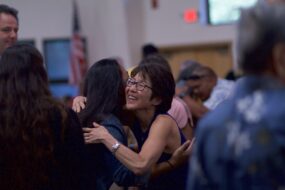March 23, 2017 • Life for Leaders
Some women were watching from a distance. Among them were Mary Magdalene, Mary the mother of James the younger and of Joseph, and Salome. In Galilee these women had followed him and cared for his needs. Many other women who had come up with him to Jerusalem were also there.
Mark 15:40-41
 In yesterday’s Life for Leaders devotion I focused on the women who were faithful to Jesus even as he was crucified. Their example stood in contrast to that of the male disciples who deserted Jesus.
In yesterday’s Life for Leaders devotion I focused on the women who were faithful to Jesus even as he was crucified. Their example stood in contrast to that of the male disciples who deserted Jesus.
What enabled the women to remain faithful even at the risk of their own well-being? Why did they stick with Jesus while the men abandoned him? Mark does not answer these questions directly. But the text does suggest at least one reason why the women remained: they had each other.
We know the names of three women who stayed with Jesus: “Mary Magdalene, Mary the mother of James the younger and of Joseph, and Salome” (15:40). Moreover, “many other women who had come up with him to Jerusalem were also there” (15:41). Many other women! Though Mark doesn’t say this explicitly, the most obvious reading of these verses suggests that these women stood near one another as they watched Jesus die. They weren’t alone, but rather they were faithful together.
I wonder if the male disciples were scattered, each one alone in his grief, fear, and shame. We don’t know this for sure, but it wouldn’t surprise me if this had been the case. Yet we do know that the women hung together, and in their community they found strength. They were able to remain faithful to Jesus because they were not alone.
You and I were created to live in community with each other. When we put our faith in Christ, we were brought into relationship not only with him, but also with our sisters and brothers in Christ. Like the women at the cross, we will find strength in hard times when we remain in close fellowship with other believers. We stand strong when we stand together.
This is especially true and especially needed when we find ourselves in difficult situations. I think, for example, of a woman I know who has been going through an extremely trying time at work. She has struggled with feeling overwhelmed, inadequate, and discouraged. Her boss has offered little in the way of affirmation. In fact, he keeps giving her more work than she can handle. What has kept this woman from quitting this job or falling apart altogether? Surely, it’s God’s grace at work in her. But it is God’s grace often in the form of sisters and brothers who offer encouragement, wise counsel, prayer, and heartfelt support. Because this woman is not going it alone, she is able to hang in there, even to thrive.
Honestly, I have a tendency to be a loner, especially when I’m stressed. May God give me the grace to be in deep community with others. And may God give you this grace as well!
QUESTIONS TO CONSIDER:
When you have gone through hard times, have you been able to share these with your fellow Christians?
Why do we sometimes try to go it alone?
What encourages you to reach out to others when you are going through difficult times?
PRAYER:
Gracious God, thank you for the example of the women who remained by the cross until the end. Thank you for their togetherness, for the fact that they stood strong because they stood with each other.
Help us, Lord, to live in genuine fellowship with our sisters and brothers in the faith. When we’re going through difficult times, may they give us strength. And may we offer the same kind of support to them when they need it.
Thank you, O God, for not leaving us to live our lives alone. Thank you for the gift of genuine fellowship with our sisters and brothers in your family. Amen.
Explore more at the Theology of Work Project online commentary: Investing in Jesus’ Work (Luke 8:3; 10:7)

Dr. Mark D. Roberts is a Senior Strategist for Fuller’s Max De Pree Center for Leadership, where he focuses on the spiritual development and thriving of leaders. He is the principal writer of the daily devotional, Life for Leaders, and the founder of the De Pree Center’s Flourishing in the Third Third of Life Initiative. Previously, Mark was the Executive Director of the De Pree Center, the lead pastor of a church in Southern California, and the Senior Director of Laity Lodge in Texas. He has written eight books, dozens of articles, and over 2,500 devotions that help people discover the difference God makes in their daily life and leadership. With a Ph.D. in New Testament from Harvard, Mark teaches at Fuller Seminary, most recently in his D.Min. cohort on “Faith, Work, Economics, and Vocation.” Mark is married to Linda, a marriage and family counselor, spiritual director, and executive coach. Their two grown children are educators on the high school and college level.





Thank you for today’s message. Though I cannot disagree with you on the women being there until the end, base does on Marks commentary….it is disappointing that many “target” Jesus’ disciples as having done just the opposite. Weren’t His disciples with Him daily? Everywhere? Weren’t they the only ones who “had the insider information”? It was they that all the public knew, not the women. The women had nothing to lose, they did not understand what was going on. The disciples did and the public knew they were part of His “team”. Just saying. I too would have run, knowing and doing what they did. Not out of lack of faith in Jesus or His teachings, but, just exactly for that faith in Him and His teachings.
PKL: Thanks for your comment. Actually, many women were among Jesus’s closest followers (Mark 15:40-41; Luke 8:1-3; 10:38-42). They certainly had much to lose by remaining near Jesus. And it appears that none of Jesus’s followers understood what was going on with his death. Yet the loyalty of the women is mentioned explicitly by Mark, in contrast with the male disciples who “deserted” Jesus (Mark 14:50).
What an encouraging and practical affirmation that we are stronger in fellowship together! I could not agree more. However, I have some concerns about the apparent presumptions this article makes that the lack of a roll call of the disciples implies they are not present. Additionally, while I do not agree with PKL’s characterization of the lack of understanding the women
may have had (despite lesser education, treatment and status, women have demonstrated impacts throughout history (Deborah, Eunice, Lydia etc.) revealing intelligence, social/economic/political skills and spiritual gifts), I do agree that they, as a group of lesser public standing, may have been free to visibly stand en masse to watch and to wait at the crucifixion. Without further comment on women’s issues, the glory of God is revealed in making divine opportunities out of what others see as only hindering conditions. It makes me proud, as a woman, when women exhibit spiritual fruitfulness, no “nasty” needed, in facing challenges as women. Secondly, the gospel account making reference to John, the beloved, may well be understood to be the an escort for the women as Christ speaks to John regarding His earthly mother, Mary, inferring his presence among or with the women. Maybe that made him safer to be front visible? Maybe he was just that brave? Finally, I find it hard to believe that the disciples were not there even if incognito. Peter summed it up, ” Lord, to whom shall we go? thou hast the words of eternal life.” John 6:68 KJV. Consider how we handle crisis: is this not the greatest moment of crisis? Death of a loved one, shattered expectations both political and spiritual, loss of their Leader, and questioning all that they thought they understood about Jesus to name a few. I find it hard to NOT imagine them present whether consoling one another or standing alone; they would have recalled in the Garden at Jesus’ arrest that He instructed them about the use of the sword and related cosmetic ear surgery. The crucifixion for the disciples, in my imagination, is more likened to a moment when you “grow up” in the face of tragedy. These were spiritually sensitive, seeking men– perhaps, they discerned it was not a time to be front and center, or perhaps they were coping with the grief in a manner better suited to men who have just lost the One they hoped for, followed and loved.
Renee, thanks for your thoughtful comment. Mark does not tell us all of the movements of the disciples. He does say that, when Jesus was taken in Gethsemane, “Then everyone deserted him and fled” (Mark 14:50). That seems pretty clear to me, and the Mark does not say that the disciples returned later. I find it quite encouraging that God can use such ordinary and fallible people to accomplish his will.
I too think that if the 11 remaining disciples had been standing together they would have quickly attracted the attention of the Roman soldiers.
My reason for writing though is to respond to one of the reflection questions. It is my experience, and I don’t believe I am alone, that if the difficult situation is my fault or feels like my fault even if it’s not, I tend to isolate myself. If the situation is not my fault, it is much easier to seek the help and consolation of my Christian friends. Shame is a powerful force that Satan uses to hi advantage. We need to secure in God’s love to overcome it.
Thanks, Nancy. Yes, shame can keep us from reaching out to others.
The deciples were given to Christ Jesus, from God the Father. In order to fulfill prophecy, as Christ stated in His prayer to the Father, I have not lost one that You gave me. Whether they were instructed by Christ before hand to let Him go it alone, or moved by the Holy Spirit, is really not the question. Taking chances of prophecy not be fulfilled, by putting oneself in harms way, was not going to happen. Remember in Jerimiah, God has a plan for ALL! And it is a good plan!
Thanks for your comment.